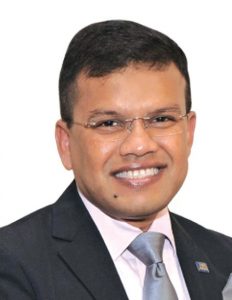September 28, 2021 is the 75th birthday of Prime Minister Sheikh Hasina, eldest daughter of Father of the Nation Bangabandhu Sheikh Mujibur Rahman, brings to our mind her political wisdom and personality, by which she has taken herself to a stage where no political figure could from a country like Bangladesh could ever imagine.
The world and her political opponents could not think that she would have such a firm hold on her ruling Awami League. Her enemies and opposition also acknowledge that Bangladesh now has an indomitable leader after decades.
She did not come to politics in a usual way. The Bangladesh Awami League had to shoulder the responsibility of accepting the cruel reality. In carrying out her duties, she is moving forward by pointing the finger at many conspiracies inside and outside the party. So far, 19 attempts have been made to assassinate her. If she can be killed, the spirit in which the independence of this country came can be shattered once again, like August 15. The rule of the country will again fall into the hands of anti-independence forces.
Sheikh Hasina spent much of her childhood in the tiny hamlet where she was born. She started her schooling there. When Bangabandhu was elected a legislator, his family shifted to Dhaka in 1954.
She was enrolled at what is now Sher-e-Bangla Girls’ School and College and later to Azimpur Girls’ High School, from where she completed her secondary education in 1965. She was then admitted to Badrunnessa Government Girls’ College.
During her bachelor course, she was elected as the vice-president of Eden Girls’ College (At that time, Badrunnessa and Eden Girls’ College were a single entity). Later, she enrolled in her Masters’ program at the Bengali Department of Dhaka University.
As a student leader, Sheikh Hasina actively took part in the six-point movement of 1966 and the student movement of 1969, which saw the abdication of General Ayub Khan.
In 1968, with the blessings of her imprisoned father, Sheikh Hasina, who is leading the country as the prime minister for the third consecutive term, got married to nuclear scientist Dr. Wazed Miah.
During the Liberation War, Sheikh Hasina and her family were interned in a house in Dhaka. On July 27 in 1971, her first child Sajib Wazed Joy was born. Her second child Saima Wazed Hossain was born on December 9, 1972.
After the assassination of her parents in 1975, Sheikh Hasina and her family were offered political asylum in India, where she stayed till 1981, when she was elected as the president of the Awami League in her absence.
Sheikh Hasina returned home on May 17, 1981, when she was greeted by a mammoth crowd that extended from the Airport to Farm Gate and Manik Miah Avenue, and she addressed a public rally.
In the 1986 parliamentary election, Sheikh Hasina was elected as a parliament member from three different constituencies. After the overthrow of autocracy in 1990, she was elected as the Leader of the Opposition in the House.
In 1996, 21 years after her father was assassinated, Sheikh Hasina led the Awami League and helped the party assume power, and became the prime minister for the first time.
On August 21, 2004, Sheikh Hasina, the then opposition leader, barely escaped an attempt on her life as grenades were lobbed at an AL rally on Bangabandhu Avenue in the capital. Although she survived the attack, at least 24 people were killed and over 200 others injured. Most of them were Awami League leaders and supporters.
In 2008, she led the Grand Alliance to an overwhelming victory acquiring 90 percent of parliament seats in the general elections. She was elected the prime minister on January 5, 2014, for the second time in a row.
Sheikh Hasina assumed the office of the Prime Minister for a third consecutive term with a thumping victory in general elections in December 2018. She is now serving the country for the 4th term and for the 3rd time in a row.
Under her leadership, Bangladesh has become a role model for development, attaining steady economic growth, becoming self-sufficient in food, and attaining marked progress in the fields of women empowerment, agriculture, education, health, infrastructure, communication, energy and power, trade, and commerce, ICT and the SME sectors.
Her most recent role in extending humanitarian support to over 1.1 million forcibly displaced Rohingyas from Myanmar, who have taken shelter in Cox’s Bazar, drew accolades from global leaders, institutions, and eminent personalities.
Asiatic Society of Kolkata honored Prime Minister Sheikh Hasina with the prestigious “Tagore Peace Award-2018” in recognition of her contribution to maintaining regional peace and prosperity.
President of Kolkata Asiatic Society Professor Isha Mohammed handed over the award to Sheikh Hasina at Taj Mahal Hotel in the Indian capital on October 5, 2019.
She also received the prestigious ‘Vaccine Hero’ award, given recognition of Bangladesh’s outstanding success in vaccination. Global Alliance for Vaccination and Immunisations (GAVI) handed over the award to the premier at a ceremony recently at the Conference Room of the UN Headquarters in New York during the ongoing 74th United Nations General Assembly (UNGA) in 2019.
The premier was conferred with the award ‘Champion of Skill Development for Youth’ for Bangladesh’s remarkable success in youth skill development. The United Nations Children’s Fund (UNICEF) conferred the award on the premier at a ceremony at Labouisse Hall of UNICEF House in the UN Plaza on September 26 in 2019.
UNICEF Executive Director Henrietta Fore handed over the award to the prime minister amid thunderous clappings of the audience.
Sheikh Hasina also received the Dr. Kalam Smriti International Excellence Awards-2019, introduced in memory of eminent scientist and former Indian President Dr. APJ Abdul Kalam.
The award was conferred upon Prime Minister Sheikh Hasina to recognize her commitment to close and mutually satisfying India-Bangladesh relations, the welfare of her people, particularly women and children, and international peace and cooperation.
Chief Adviser of the Dr. Kalam Smriti International Advisory Council Ambassador TP Sreenivasan handed over the accolade through a ceremony at the Prime Minister’s Office here on September 16, 2019.
Sheikh Hasina was also conferred with various honourary degrees, accolades, and awards in recognition of her leadership excellence and intellectual flair. These include: honorary Doctor of Laws by the Waseda University of Japan, honorary Doctorate of Philosophy in Liberal Arts by University of Abertay Dundee, UK, honorary Degree of Desikottama by Visva-Bharati University of West Bengal, India, honorary Doctor of Laws by the Australian National University, honorary Doctor of Humane Letters by the Bridgeport University, USA, honorary Doctor of Laws by the University of Dhaka, Paul Haris Fellowship by the Rotary International, UNESCO’s Houphouet-Boigny Peace Prize in 1998, M K Gandhi Award in 1998, Mother Teresa Award in 1998 and 2006, Pearl S. Buck Award by Randolph Macon Women’s College of USA in 1999, CERES Medal in 1999, UN Award for MDG achievement (child mortality) in 2010, Indira Gandhi Peace Prize in 2009, South-South Award in 2011, UN Award for MDG Achievement in 2013, Rotary Peace Prize in 2013, Tree of Peace in 2014, ICT Sustainable Development Award in 2015, Champions of the Earth in 2015, Agent of Change Award in 2016 and Planet 50-50 Champion in 2016.
The people’s support for Awami League is 63.5 percent, while the support for Sheikh Hasina is 66 percent (IRI survey). She has surpassed her party behind in popularity. Sheikh Hasina’s party is popular because of her popularity. There is no other example in the world where a party leader is more popular than a party. This is where Sheikh Hasina is incomparable. She has taken herself to such heights that she is now compared to world leaders. She is ranked 29th on the list of the most powerful women in the world. All this has been possible due to her solid political wisdom and personality.
Political researchers and historians believe that her zero-tolerance against militancy, Bangladesh’s progress in the economy, ensuring the punishment of Razakars, prosecuting Bangabandhu’s assassins, and the friendly foreign policy she is pursuing in the politics of the subcontinent have skyrocketed her popularity. While many leaders of the Awami League are suffering from existential crisis due to their controversial activities and are criticizing the party, the people of this country are relying on one and only Sheikh Hasina. Again, she has proved that there is no other alternative to her.
In 2009 Sheikh Hasina took the lead of a failed state (Bangladesh became champion in corruption during 2001-2007) to prosperity from the black clutches of militancy. Now Bangladesh has moved away from a failed state to the most prosperous state with an average GDP growth rate of 8% and during the COVID-19 is 5.24%. Ignoring the eyes of the western world, showing their thumbs up to their non-cooperation, all the enviable progress that Bangladesh is making today has been made possible by the leadership of Hon’ble Prime Minister Sheikh Hasina. She is managing the country with one hand and the party with the other. She is the most successful president of Awami League after ’75 and also the most successful statesperson. She has no pause in carrying out dual responsibility with all the courage and self-determination.
She has remained steadfast in her ideals and beliefs, did not panic in danger, has overcome adversity. Even after being in power for a long time, egoism and intimacy did not get her. She kept her feet on the ground all the time. Impossibly brave again fiercely compassionate. One point to be noted is that she has no mercy for rogues or thugs.
But on the other hand, she opens her heart and is very kind to the oppressed. Most importantly, she understands the language of the people. She understands and foresees the hopes of the people and their aspirations. When the heads of state or government go the distance of the stars from the people, development activities cannot be active. Sheikh Hasina is quite the opposite. She picked up the phone of strangers, listened to them. As a result, she has been able to establish a connection with the people. Even she has shown her kindness to BNP Leader Khaleda Zia, a convicted under Bangladesh court for corruption. That is why Sheikh Hasina’s popularity has not diminished even after being in power for more than a decade. Instead, she is the one who has no choice now. Sheikh Hasina is like Bangladesh now. All the people of the country believe that Sheikh Hasina is Sheikh Hasina’s alternative.
My sincere Tribute to Prime Minister Sheikh on her 75th birthday. I wish her a very long life to steer Bangladesh to a developed country, free from militancy, poverty, and any kind of fundamentalism. She has to live long for the country, the region, and the peacekeeping people of the world.
Joy Bangla, Joy Bangabandhu.
Joyetu Sheikh Hasina.

Dr. Fakhrul Islam Babu
Joint General Secretary
Bangladesh Awami League, Hong Kong EC
Executive Director:
China Bangladesh Friendship Center Limited-CBFCL
